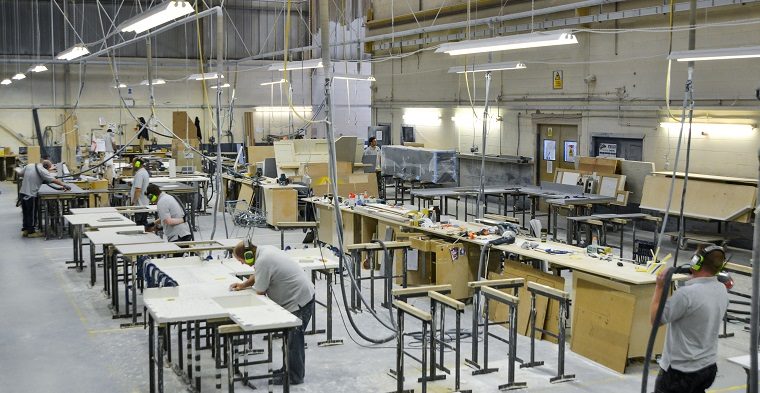
Insider tips from a solid surface kitchen worktop fabricator
Posted by Whitehall on 10th OctAsk a solid surface kitchen worktop fabricator…
Beautifully crafted, bespoke kitchen worktops require expert fabrication.
This is because solid surface materials like Corian®, HI-MACS and Artemis need to be treated differently to materials like natural stone, due to their synthetic, acrylic make-up. They have to be cut and sanded using precision machinery and joined using a glue derived from the same material.
But it’s these properties which also make solid surfaces so desirable. They are extremely hardwearing and can be shaped to create bends and curves, as well as clean-cut lines and edges.
To get a kitchen worktop spot on, you need to think carefully about the design. That’s why working with an experienced kitchen worktop fabricator can help.
We caught up with Danny Greenwood, a Director at Whitehall, to tap into his insider expertise. Here’s what he had to say…
 Q: How long does it take to produce an average-sized kitchen worktop?
Q: How long does it take to produce an average-sized kitchen worktop?
A: An average kitchen worktop can take between 15-20 hours of fabrication time, but this fluctuates depending on the specification of the room and the complexity of the design.
The same size kitchen but with different specs will vary in hours, especially once features like integrated appliances, kitchen islands, sideboards and splashbacks are factored in.
To the customer, this might amount to around 2-3 weeks from quote to installation.
Q: What’s the most challenging part of the fabrication process?
A: From domestic to commercial work, design trends are always changing, meaning it’s necessary to experiment with new methods to achieve increasingly ambitious designs.
The way to plan for this is by maintaining an experienced team of fabricators, which we are lucky enough to have at Whitehall. If we are presented with a particularly tricky brief, we can get everyone together to plan the best possible course of action.
Q: What’s the number one tip you’d give someone designing a kitchen worktop?
A: Don’t rush it. The kitchen is the heart of the home, so spend time thinking about how best to incorporate the worktop into the design. Sometimes customers overlook the importance of the kitchen worktop but it’s the most used feature of your whole design.
We do much more than simply prepare food at our kitchen worktops. They can double up as dining tables, bars or workspaces. It’s important to think about how your kitchen will be used and factor this into your worktop design.
Q: Is there anything customers ask for that you recommend against?
We will always try to accommodate our customers’ design exactly as they’d like it. However, there are times where we spot something that could become an issue, such as surfaces that are too large or small for a space. In these circumstances, we may recommend alterations to the design.
The manufacturer of Corian®, DuPont, also has specific regulations which sometimes require changes for safety and practicality reasons.
This could include details like adhering to the minimum distance required between the edge of the hob to the wall cladding or upstand. Another example is the requirement for structural steel supports on breakfast bars or seating areas where the overhang is in excess of 300mm.
In a situation where a customer wants something that doesn’t meet with these specifications, we help them tweak the design to make sure it’s safe but also to their tastes.
Q: What factors make a solid surface worktop go the distance?
A: If a worktop has been professionally installed by a specialist kitchen worktop fabricator, it will last for decades and most likely outlive the rest of your kitchen.
To achieve this durability, a surface needs to be built in a factory setting, before being assembled and fitted on location. Several processes take place at the factory which protect the strength of solid surfaces during fabrication – you can read what they are here.
From a customer’s perspective, understanding how to properly care for your surface is really important too. Solid surface worktops are resistant to most stains and scratches, but they can crack or mark in certain circumstances. Proper care and caution will increase the lifespan of a worktop.
To find out more about how to caring for a solid surface kitchen worktop, take a look at this blog ‘The dos and don’ts of caring for a Corian® surface’
We hope you’ve found these answers useful. If you’d like any more worktop design advice, you can talk to our experts.
Back to blog


